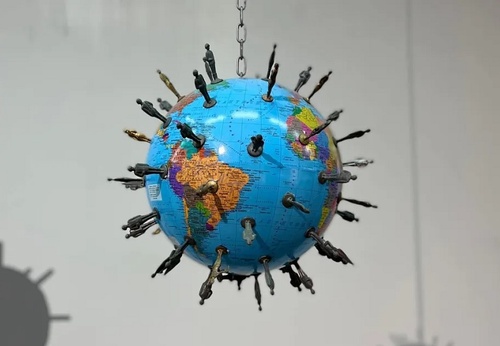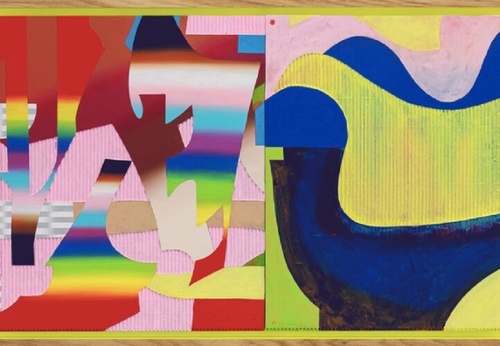
Centre Pompidou debuts in South America with R$200 million museum in Foz do Iguaçu
One of the world's greatest icons of modern and contemporary art will have its first branch in the Americas — and the chosen destination was Foz do Iguaçu, in Paraná. The official announcement of the new Centre Pompidou unit was made in Paris at the end of May by Governor Ratinho Junior and the president of the French institution, Laurent Le Bon.
Scheduled to open by 2027, the Latin American branch of the museum will be built on a 24,000 m² plot of land donated by CCR Aeroportos, next to Foz International Airport and just a few minutes from Iguaçu National Park. The investment exceeds R$200 million, according to the state government.
With a project designed by award-winning Paraguayan architect Solano Benítez, winner of the Golden Lion at the Venice Biennale in 2016, the new space promises to integrate architecture and territory with a proposal that is sensitive to the landscape of the Triple Frontier. The structure will house exhibition halls, a library, studios, laboratories, a restaurant and common areas.
The museum as an economic and cultural engine
The arrival of the Pompidou in Brazil marks a strategic shift in the international projection of Latin American art. The program will be multidisciplinary, focusing on exhibitions, shows and residencies focused on artistic production from Brazil, Argentina and Paraguay.
In addition to the cultural impact, the project reinforces the role of Foz do Iguaçu as a tourist and creative hub, adding value to the region already known worldwide for its Falls — elected one of the Seven Natural Wonders of the planet.
Negotiations with the French government began in 2020 and have advanced in recent months with technical visits and alignment meetings. Founded in 1977, the Centre Pompidou has a collection of more than 120 thousand works by names such as Picasso, Miró, Dalí and Frida Kahlo, and has branches in Belgium, Spain and China.
The Brazilian unit will be the first on South American soil — and a symbolic gesture of rapprochement between France and Brazil, which celebrate 200 years of diplomatic relations in 2025.
Source

- January 28, 2026
Globalization and New Discourses in Contemporary Latin American Art

- January 28, 2026
Contemporary Art in Latin America

- January 27, 2026
Aztecs in the Empire City: “The People Without History” in The Met


- January 27, 2026
The Evolution of Art: From Classical to Digital

- January 27, 2026
What are Visual Arts and Why Do They Matter Today?

- January 27, 2026
Selected Illustration Gallery of Venezuelan Artists

- January 27, 2026
Selected Caricature Gallery of Cuban Artists

- January 26, 2026
Bolivia Poster Biennial (BICeBé 2013)

- January 27, 2026
The exhibitions "From Tàpies to Siqueir…

- January 19, 2026
The Pulse of Art, Design, and Culture R…

- January 19, 2026
The Argentine museum celebrates 25 year…

- January 08, 2026
Latin American Pavilion Among the New A…

- January 07, 2026
Material Art Fair 2026

- January 05, 2026
The Latin American Pavilion Marks a Mil…

- December 31, 2025
the 10 million-dollar sales of 2025

- December 30, 2025
MALBA Doubles Collection and Reposition…

- December 29, 2025
The FEMSA Collection will celebrate its…

- December 25, 2025
“Ancestral Artist”: A Look at the Craft…

- December 25, 2025
Winner of the 13th Most Important Conte…

- December 25, 2025
Malba Acquires the Daros Latinamerica C…

- December 24, 2025
2026, a Key Year in Cultural Exchange B…

- December 23, 2025
Sacred Art Celebrates Christmas Through…

- December 22, 2025
MACA Inaugurates Exhibitions of Fontana…

- December 20, 2025
Costantini Acquires the Daros Collectio…

- December 17, 2025
ARCOmadrid Announces Participating Gall…

- December 17, 2025
Eduardo Costantini Acquired a Collectio…

- December 15, 2025
From Chile to Gaza: «Palestine Cries,»

- December 15, 2025
Latin American Artists MACLA and Montal…

- October 08, 2023
Illustrations reflect the brutal Israel…

- December 25, 2023
The jury statement of the Iran-Brazil F…

- March 21, 2024
The history of art in Palestine

- July 29, 2023
History of Caricature in Brazil

- September 01, 2023
Neural Filters in new photoshop 2023

- April 20, 2024
Poignant Image of Grief Wins Mohammed S…

- May 22, 2025
Brady Izquierdo’s Personal Exhibition O…

- June 29, 2024
Exhibition at Centro MariAntonia contra…

- October 21, 2023
Erick Meyenberg and Tania Ragasol at th…

- February 18, 2024
7 Ways to Understand What Visual Arts A…

- May 15, 2024
Eleven murals for Gaza painted across t…

- March 30, 2024
illustration websites in Latin America

- August 09, 2023
Venezuela mural expresses solidarity wi…

- March 14, 2024
museum of statue of van gogh

- May 25, 2025
Bordalo II to hold exhibition in Paris …

- March 15, 2024
museum of sculpture of Salvador Dali

- May 20, 2024
Latin American Festival of Performing A…

- January 23, 2025
Art Palm Beach 2025

- March 18, 2025
Works by Cuban Artist Eduardo Abela in …

- January 04, 2025
Material Art Fair 2025

- May 15, 2024
Eleven murals for Gaza painted across t…

- February 18, 2024
7 Ways to Understand What Visual Arts A…

- January 02, 2025
13 commemorations that will mark the cu…

- October 17, 2023
The influence of Latin American artists…

- February 03, 2024
THE HISTORY OF NAIF ART

- July 02, 2024
One of the largest urban art galleries …

- November 17, 2023
Fernando Botero's work is booming after…

- October 08, 2023
Illustrations reflect the brutal Israel…

- July 29, 2023
Piracicaba International Humor Exhibiti…

- December 25, 2023
The jury statement of the Iran-Brazil F…

- November 06, 2023
Heba Zagout: Palestinian artist murdere…

- December 10, 2023
Sliman Mansour and Palestinian art on t…

- March 14, 2024
museum of statue of van gogh

- February 01, 2025
A maior exposição de Botero em Barcelona

- March 21, 2024
The history of art in Palestine

- July 20, 2024
First International Mail Art Biennial 2…

- April 20, 2024
Poignant Image of Grief Wins Mohammed S…

- October 30, 2023
Palestinian turns images of the Gaza co…

- September 01, 2023
Neural Filters in new photoshop 2023

- February 08, 2024


